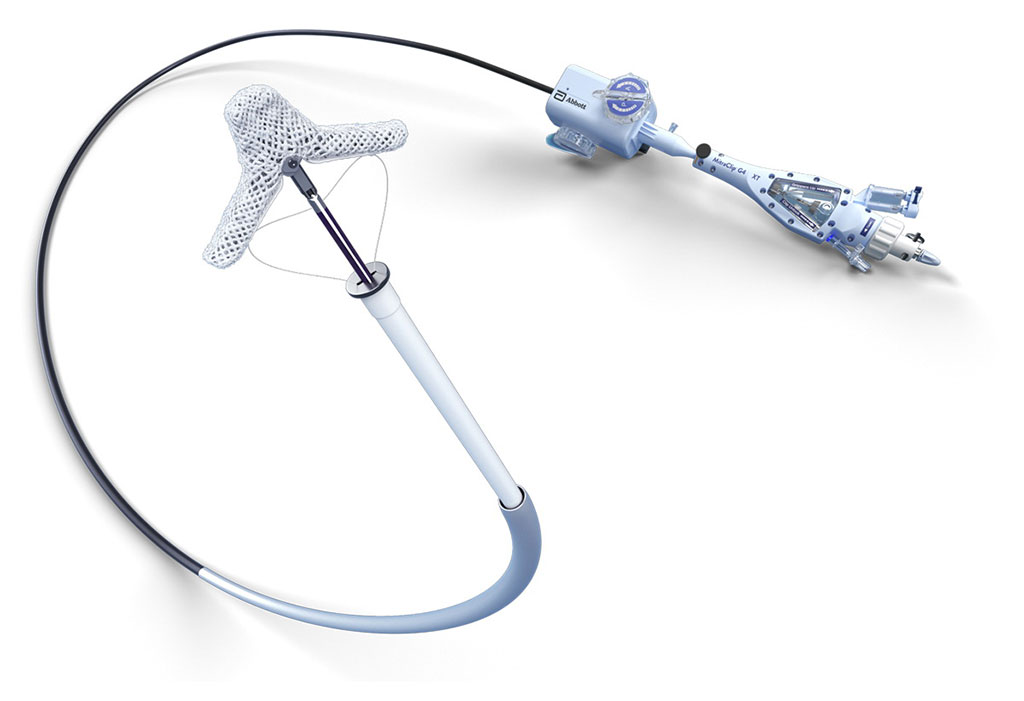Transcatheter Mitral Valve Repair Reduces Hospitalization, Improves Survival in Heart Failure Patients
|
By HospiMedica International staff writers Posted on 07 Mar 2023 |

Left ventricular cardiomyopathy is the most common type of heart failure in which the heart’s main chamber (the left ventricle) becomes enlarged and incapable of properly pumping blood out of the heart. Approximately Roughly 30% of patients with left ventricular cardiomyopathy go on to develop a secondary heart condition called severe mitral valve regurgitation. In this heart condition, the mitral valve, which controls the flow of blood from the left atrium into the left ventricle, becomes distorted from the enlarged left ventricle, resulting in its leaflets failing to close completely. This leads to blood leaking backwards, increasing pressure in the heart, and increasing the patient’s risk of hospitalization and death. In most cases, it is possible to treat this condition with a minimally invasive procedure called transcatheter edge-to-edge repair (TEER) that involves clipping the leaflets of the mitral valve together. The procedure is usually performed with a device called the MitraClip, manufactured by Abbott (Abbott Park, IL, USA)
Breakthrough findings from a new study led by the Icahn School of Medicine at Mount Sinai (New York City, NY, USA) suggest that the utilization of transcatheter mitral valve repair in heart failure patients with mitral regurgitation can lower the long-term hospitalization rate by almost 50% and reduce the risk of death by nearly 30% compared to heart failure patients who do not undertake the minimally invasive procedure. This multi-center trial is the largest trial to examine the safety and effectiveness of transcatheter mitral-valve repair in a heart failure population using Abbott’s MitraClip system. It shows the treatment option can significantly improve patient outcomes in those with heart failure who do not respond to conventional treatments.
In the “Cardiovascular Outcomes Assessment of the MitraClip Percutaneous Device” study, or COAPT, researchers examined whether treating the severe secondary mitral valve regurgitation with TEER, which has no direct effect on the underlying weakened heart muscle, can improve outcomes in heart failure patients beyond medical therapy alone. The two-year results, published in 2018, showed for the first time that treating secondary mitral valve regurgitation improved patients’ symptoms, reduced hospitalizations, and led them to live longer. Now, their latest five-year results show further significant findings.
The study examined 614 patients recruited between December 27, 2012, and June 23, 2017, from 78 centers in the U.S. and Canada. All patients suffered from cardiomyopathy and secondary, severe mitral valve regurgitation, despite receiving optimal medical therapy for heart failure. Half of the patients continued their heart failure medication, while the other half underwent transcatheter valve repair involving the MitraClip, but continued with their heart failure medication. Over the course of five years following treatment, the annual rates of heart failure hospitalizations were found to be 33.1% in the MitraClip group compared to 57.2% in patients treated only with medication, signifying a 47% reduction. Moreover, there was a 29% decrease in deaths from heart failure in the MitraClip group compared to patients taking medication only, and a 28% reduction in all-cause death. Despite having decreased rates of hospitalizations and deaths with successful treatment, 73.6% of patients in the MitraClip group still experienced one or more heart failure hospitalizations or died at the end of five years (compared to 91.5% of patients in the medication-only group). Therefore, the researchers have emphasized the need for advanced therapies to treat these high-risk patients.
“Treating severe secondary mitral regurgitation in appropriate patients with cardiomyopathy is important - our study shows that five years after the MitraClip procedure, patients feel better, are hospitalized less frequently, and live longer,” said lead author Gregg W. Stone, MD, Director of Academic Affairs for the Mount Sinai Health System and Professor of Medicine (Cardiology), and Population Health Science and Policy, at Icahn Mount Sinai. “It’s critical for physicians to recognize mitral regurgitation in patients with cardiomyopathy, then treat this secondary issue as early as possible to improve outcomes in this heart failure group.”
Related Links:
Icahn School of Medicine at Mount Sinai
Abbott
Latest Critical Care News
- Ingestible Capsule Monitors Intestinal Inflammation
- Wireless Implantable Sensor Enables Continuous Endoleak Monitoring
- Pulse Oximeter Index Offers Non-Invasive Guides for Fluid Therapy
- Wearable Patch for Early Skin Cancer Detection to Reduce Unnecessary Biopsies
- 'Universal' Kidney to Match Any Blood Type
- Light-Based Technology to Measure Brain Blood Flow Could Diagnose Stroke and TBI
- AI Heart Attack Risk Assessment Tool Outperforms Existing Methods
- Smartphone Imaging System Enables Early Oral Cancer Detection
- Swallowable Pill-Sized Bioprinter Treats GI Tract Injuries

- Personalized Brain “Pacemakers” Could Help Patients with Hard-To-Treat Epilepsy
- Microscopic DNA Flower Robots to Enable Precision Medicine Delivery
- Origami Robots to Deliver Medicine Less Invasively and More Effectively
- Improved Cough-Detection Technology Aids Health Monitoring
- AI Identifies Children in ER Likely to Develop Sepsis Within 48 Hours
- New Radiofrequency Therapy Slows Glioblastoma Growth
- Battery-Free Wireless Multi-Sensing Platform Revolutionizes Pressure Injury Detection
Channels
Surgical Techniques
view channel
Robotic Assistant Delivers Ultra-Precision Injections with Rapid Setup Times
Age-related macular degeneration (AMD) is a leading cause of blindness worldwide, affecting nearly 200 million people, a figure expected to rise to 280 million by 2040. Current treatment involves doctors... Read more
Minimally Invasive Endoscopic Surgery Improves Severe Stroke Outcomes
Intracerebral hemorrhage, a type of stroke caused by bleeding deep within the brain, remains one of the most challenging neurological emergencies to treat. Accounting for about 15% of all strokes, it carries... Read morePatient Care
view channel
Revolutionary Automatic IV-Line Flushing Device to Enhance Infusion Care
More than 80% of in-hospital patients receive intravenous (IV) therapy. Every dose of IV medicine delivered in a small volume (<250 mL) infusion bag should be followed by subsequent flushing to ensure... Read more
VR Training Tool Combats Contamination of Portable Medical Equipment
Healthcare-associated infections (HAIs) impact one in every 31 patients, cause nearly 100,000 deaths each year, and cost USD 28.4 billion in direct medical expenses. Notably, up to 75% of these infections... Read more
Portable Biosensor Platform to Reduce Hospital-Acquired Infections
Approximately 4 million patients in the European Union acquire healthcare-associated infections (HAIs) or nosocomial infections each year, with around 37,000 deaths directly resulting from these infections,... Read moreFirst-Of-Its-Kind Portable Germicidal Light Technology Disinfects High-Touch Clinical Surfaces in Seconds
Reducing healthcare-acquired infections (HAIs) remains a pressing issue within global healthcare systems. In the United States alone, 1.7 million patients contract HAIs annually, leading to approximately... Read moreHealth IT
view channel
Printable Molecule-Selective Nanoparticles Enable Mass Production of Wearable Biosensors
The future of medicine is likely to focus on the personalization of healthcare—understanding exactly what an individual requires and delivering the appropriate combination of nutrients, metabolites, and... Read moreBusiness
view channel
Philips and Masimo Partner to Advance Patient Monitoring Measurement Technologies
Royal Philips (Amsterdam, Netherlands) and Masimo (Irvine, California, USA) have renewed their multi-year strategic collaboration, combining Philips’ expertise in patient monitoring with Masimo’s noninvasive... Read more
B. Braun Acquires Digital Microsurgery Company True Digital Surgery
The high-end microsurgery market in neurosurgery, spine, and ENT is undergoing a significant transformation. Traditional analog microscopes are giving way to digital exoscopes, which provide improved visualization,... Read more
CMEF 2025 to Promote Holistic and High-Quality Development of Medical and Health Industry
The 92nd China International Medical Equipment Fair (CMEF 2025) Autumn Exhibition is scheduled to be held from September 26 to 29 at the China Import and Export Fair Complex (Canton Fair Complex) in Guangzhou.... Read more














